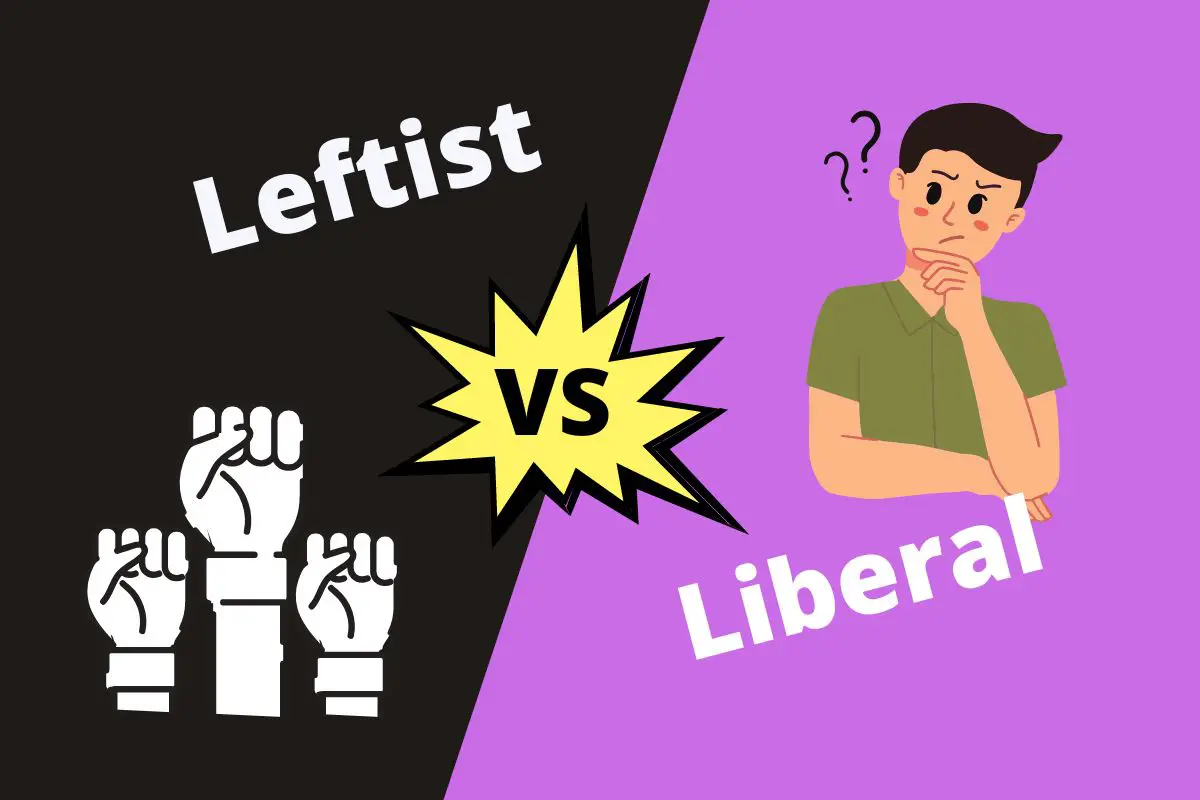Leftists believe in equality and egalitarianism, and their philosophy is based on the progress and goodness of the human race. Leftism stands for the protection of civil and liberal rights. Liberalists, on the other hand, believe in the consent of the governed, rights of individual liberty, and equality before the law.
If you follow politics, you’ve come across the terms leftist and liberal. Leftism and liberalism are the two divisions in the American political scenario representing two different principles.
Table of Contents
Leftist vs Liberal
| Leftist | vs | Liberal |
| Leftists are anti-capitalists who believe in protecting and uplifting the poor and disadvantaged section of society. | Definition | Liberals believe in enhancing and protecting individual freedom but with the government’s help. |
| The use of the term left became prominent in 1815 after the restoration of the French monarchy | Started in | Liberalism became more prominent during the Age Of Enlightenment |
| Yes | Support for the French Revolution | Yes |
| Thomas Paine | Pioneers | John Locke |
| Equal rights, protection, social security, and upliftment of the poor and disadvantaged as they believe the upper classes have overlooked them | Stands for | Progress of the society by following government rules and policies |
Who are the Leftists?
Leftism has its roots in the Labor Party of England. It began as an opposition to addressing the growing poverty issue because of the liberal capitalist system. Leftists are far-left when compared with liberals.
Leftist ideology mainly concerns those with a disadvantageous position in society or who believe they are somewhat lagging behind the rest of the population. They take activism seriously and want to impact the lives of the poor in a positive way.
Protesting Liberalism
Leftism started as a protest against liberalism, which focused more on the profit of industrialists. At the same time, laborers were left behind to struggle for their lives.
Leftists can be communists, anarchists, and socialists who believe in anti-capitalism.
Berry Clerk, professor of economics, stated, “Leftists claim that human development flourishes when individuals engage in cooperative, mutually respectful relations that can thrive only when excessive differences in status, power, and wealth are eliminated.”
As we can understand from the definition, left-wing ideology believes in the progress and development of the entire human race. They are against the social divisions, which according to them, are exploiting the disadvantaged section or the working classes.
Leftist economic policy can differ from person to person. Many leftists believe in the nationalization of the economy and central planning, for example.

Who are the Liberals?
Liberalism is another branch of political philosophy that believes in individual liberty. Liberalists believe in enhancing and protecting personal freedom, but with the government’s help.
Liberalism considers the government necessary to protect individual rights but also finds it a threat. Therefore, laws, police, and judges are required to protect individual rights and liberty.
Liberals support civil and human rights, secularism, economic and political freedom, freedom of the press, free speech, freedom of religion, the market economy, and private property.
Liberalism’s Roots
Liberalism began during the Age of Enlightenment. Its sole motive was to replace the monarch’s absolute or authoritarian power and control, and it wanted to end royal monopolies.
Liberal economic policy functions within capitalism. Their goal was to end hereditary privileges and support free trade, free market, etc.
Simply put, the liberal party arose as a protest against the supreme powers of royal families and wanted to promote individual well-being.
How the Term Liberal is Used
There’s a lot of confusion regarding the political stand of liberals. In the United States, liberals stand as social liberals and not as classic liberals.
Leftists see liberals as centrists or center-left. But people from the right wing see liberals simply as leftists. Some right-wing people don’t see any difference between leftists and liberals.
The confusion about liberalism is further raised due to the various states of liberalists worldwide. For instance, the Liberal Party in Canada is considered the center-left. In contrast, the Liberal Democratic Party of Japan is considered conservative.
Liberals often promote social democracy. This means they want to achieve the markers of a socialist society within a capitalist framework.
Many liberal American politicians are often labeled as leftists in American media, and the GOP are social democrats. Bernie Sanders is an example of a liberal who is labeled as a leftist.

Summarizing the Differences
Leftism and liberalism are the two often consumed terms in the political spectrum. Although there are some similarities between the two philosophies, they also have their differences.
If you’ve enjoyed this post, check out our post comparing and contrasting fascism and communism.

